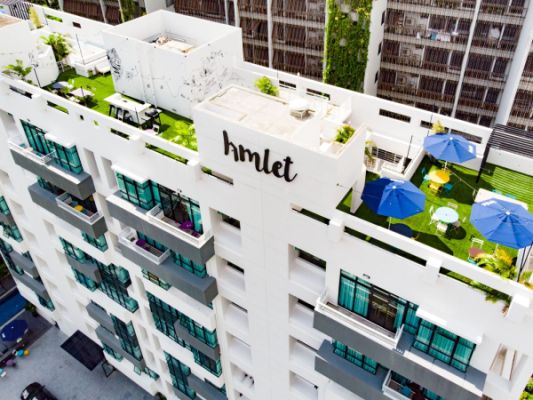Hmlet merges with European co-living player Habyt
Sign up now: Get ST's newsletters delivered to your inbox

The Habyt merger marks a turnaround of sorts in Hmlet's fortunes from 2021.
PHOTO: HMLET
SINGAPORE (THE BUSINESS TIMES) - Co-living start-up Hmlet will merge with European co-living start-up Habyt via an equity share swap, with Habyt founder and chief executive Luca Bovone leading the combined entity.
This comes after Habyt acquired two other co-living players - Milan-based Roomie last month and Frankfurt-based homefully in June last year - making it one of the largest operators in the sector in Europe.
Its portfolio has more than 6,000 housing units across 15 cities in six countries in Europe.
Habyt and Hmlet also closed an undisclosed funding round led by existing investors Burda Principal Investments and Sequoia Capital, with new investor SassCorp, the Sassoon family office.
Other undisclosed existing investors also participated in the new funding round.
Hmlet chief real estate officer Joshua Li said: "I think all this goes to show investors are supportive of this direction that we are taking - which is global aspirations, and really expands our vision beyond Singapore and Asia."
Post-merger, Mr Li will be appointed head of expansion, Asia-Pacific, at Habyt.
Informal talks about a merger between the two began in the third quarter of last year, with the Habyt team travelling to Singapore in the next quarter, when matters turned serious.
Hmlet CEO Giselle Makarachvili said: "This conversation was very natural among both of us. We wanted to start scaling, we wanted to be looking into this consolidation story, and Habyt wanted to move into Asia and have a presence in a second continent. So that's why this has been done with no cash involved and simply on a share swap."
Ms Makarachvili took on the CEO role in October after co-founder Yoan Kamalski exited the company in March last year. She will be the head of Asia-Pacific for Habyt post-merger.
Hmlet will continue to operate under the Hmlet brand.
The Habyt merger marks a turnaround of sorts in Hmlet's fortunes from last year, when it raised a down round, or a funding round, at a lower valuation, backed out of leases and had both founders leave.
Now the co-living start-up is riding on the tailwind of rising rental demand in its main markets of Hong Kong and Singapore.
Hong Kong has consistently performed well, according to Ms Makarachvili, and the portfolio in Singapore has turned around, with outstanding occupancies across all properties.
Mr Li said: "Adapting to the local audience has been critical in maintaining our 90 per cent occupancies, because the fundamentals of our asset class is such that residential prices are still out of reach in Hong Kong."
Hmlet claims it has a 90 per cent occupancy rate in its Hong Kong properties, while its Singapore properties are 96 per cent occupied as at the end of last month.
The co-living start-up recently launched a new property in Singapore - Hamilton, consisting a row of eight conservation shophouses with 68 rooms.
In Hong Kong, three new buildings, Hmlet Knight on Wyndham, Hmlet Portland Street and another centrally located hotel are slated to open in the second quarter of this year.
Hmlet says it is on track to manage 2,300 rooms by the end of this year. It is currently managing 1,200 units across Singapore, Hong Kong and Japan.
Post-merger, Habyt will manage more than 8,000 rooms across two continents.
Competition in the co-living sector is rapidly stiffening, with competitors also looking to scale up their operations.
Ascott, owned by Singapore Exchange-listed group CapitaLand Investment, this week announced plans to sign 150 properties with more than 30,000 units under its lyf co-living brand by 2030.
Ascott currently has 17 lyf co-living properties with more than 3,200 units, having just opened a second property in Singapore with 324 units that it says are 85 per cent occupied.
The sector has seen a burgeoning number of co-living players.
More than 10 players are competing in Singapore alone, with the likes of Cove, The Assembly Place and lyf all vying for tenants.
This makes consolidation key for expansion, according to Ms Makarachvili.
"That will allow us to significantly scale faster. We are in a business where scale really matters, and the combined entity will now be reaching more than 8,000 rooms under management, which really is key for becoming a global player in this sector," she said.


